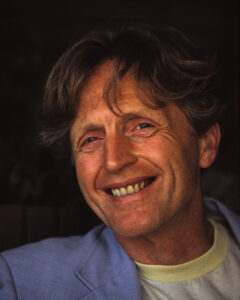
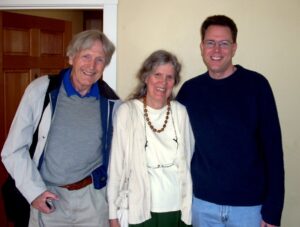
Passcode: 949307



I would like to thank Alexa for taking several hours before Latihan on Sunday to transform the back entrance to the women’s hall. She has truly created a beautiful and welcoming area! Alexa also brought a rug for the area which is from Tibet. I didn’t get a picture of it, but is also gorgeous.
In addition to the rug, Alexa also donated the chair and little table in the entrance to the women’s hall.

We will have a potluck kedjiwaan day this Sunday January 8th after latihan.
There will be a talk by Ibu Rahayu, and also testing to follow if people would like.
12 BDO 1 – Bandung, Indonesia, 05/12/2012It is in the Subud Library with many other talks of Bapak and Ibu Rahayu. Link here. https://subudlibrary.net/video/rahayu video/video 34/video_34.HTM
Big thanks to everyone who came to the holiday party!
The food was delicious, the company was so very wonderful to have.
Special thanks to Alexa for finding the group a lovely big new dining room table and chairs, and big thanks to all the individuals who helped move the table first into the garage and then into the dining room.
Alexa, heartfelt thanks also for bringing thoughtful gifts for the committee and crew.
Extra special thanks to members who graciously invited non-members to our event, and members who invited their children.
I (Jim) am still happily reliving moments from our party.
Click below to see Rachman’s photos from the party! 
Jackson Wright, the grandson of Edward Wright, longtime Subud member from Marin County, California, was opened after latihan on Sunday! Please make him feel welcome when you see him!


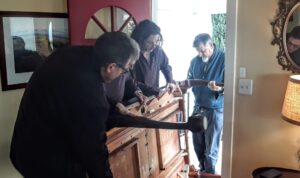
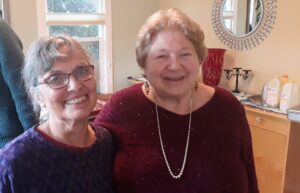
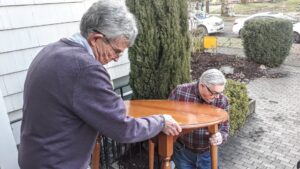
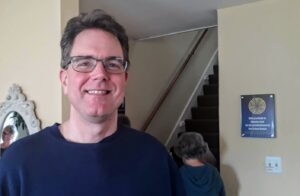
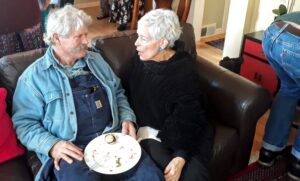
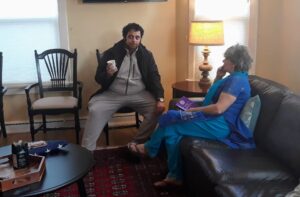
Click the link below to see all the rest of the photos!
Reminder! We will be having a holiday party after latihan Sunday, December 18th. It will be a potluck and non-members and children are welcome. Festivities will start at 12:15 PM! All welcome!
Click below for a link to photos from our last gathering!
| Dear Subud Brothers and Sisters,
Fredrick Branchflower, our family’s beloved patriarch, Subud brother, and dear friend to so many, passed away peacefully in our home on November 28, 2022 at the age of 86. His loving commitment to family, his friendships and service, along with his deep love and appreciation for Subud, were the principles that guided his life. This week we have been so blessed to receive an outpouring of love from friends sharing their condolences as well as their experiences with him. One poignant card contained the quote, “Sometimes only one person is missing and the whole world seems depopulated.” Yes. Dad was born in 1936, raised in both Seattle and Bainbridge Island, a child during the second World War. When he was two years old, his parents took him to meet their dear friend’s new baby (Melanie) in the hospital. One of his famous family stories recalls that twenty years later, in 1958, he impulsively shaved his head after watching Yul Brynner in “The King and I” and then proposed to my mom the next day. Despite the loss of that beautiful head of hair, she said ‘yes’! He figured she must have loved him then. Last June, they celebrated their 64th anniversary together. Dad seemed to naturally embrace fatherhood. I can still hear his loud whoops at our many games or plays, and remember so many games of catch or Pickle in the backyard. He invited us every night at dinner to share about our day. He taught us Mastermind and Go. We felt listened to and challenged. In his memoir, Dad wrote, “If I was to say what is most important to me, I would say God, Family/Friends and Health would be my top three. It is because of family and friends that my life has been so complete and wonderful.” Dad had friends all over the world, in every walk of life, because he cared deeply about people. He had stories in his pocket from 50 years in Subud, 20 years in the Navy, and was a tireless advocate for the homeless and active as a volunteer in so many organizations we’ve lost count. If Fredrick touched your life in some way, our family invites you to come appreciate and remember him with us. A celebration of his life will be held at the Spring Street Subud House in Seattle on Saturday, February 25th, beginning at 3 p.m. Debbie Machado will be preparing heavy hors d’oeuvres, all dad’s favorites, so please take a moment to RSVP here so she can prepare the right quantities. Should anyone wish to make a memorial donation, we know Fredrick would greatly appreciate a gift to any of the Subud charities/organizations. With love and gratitude, Isabel Gates (and Melanie)
|
Reminder! We will be having a holiday party after latihan Sunday, December 18th. It will be a potluck and non-members and children are welcome. Festivities will start at 12:15 PM! All welcome!
From Oswald.
I’m sure that each of us has a story about how Fredrick touched us in one way or the other. At our November Kedjiwaan Gathering at the Menucha Retreat and Conference Center – the last time I saw and spoke to Fredrick – we all told stories about either our opening, or something about our Subud journey we wanted to share.
My story concerned the different Subud enterprises that I had been a part of and how each one of them helped me to find what I needed for that time in my work life. One of those Subud enterprises was Branchflower Software.
In 1991, we moved to Bellevue and became a part of the members who practiced the latihan on the eastside. Sometimes we did latihan at the Blanchflower’s home in Redmond. When we had moved to this area, I fully expecting I would continue the work I had started in the Los Angeles area, selling used technology. That wasn’t happening and I was pretty depressed about it.
One time after latihan I mentioned this to Fredrick and he offered me a sales job with his Branchflower Software company. His product was a contact management program for small businesses. I was given the task of training and sales and started to go to conferences with Fredrick’s son Stephen.
I didn’t make a lot of sales, but I did learn the software business and gained confidence in my abilities because of Fredrick’s confidence in me.
Later Fredrick worked with a partner to create a product configuration software addon for a major manufacturing software company creating the first such product for the new Windows platform. Out of his work I was given the opportunity to sell an entire manufacturing software suite for the same company. I never sold a single one.
However, what I did gain from both of these experiences was the confidence I needed to next be able to work for Microsoft and many other software companies for the next 20 years. All of that success I owe to Fredrick’s faith in me.
One last thought on Fredrick’s work on enterprise. His desire to leave an enterprise that would provide funds for Subud continued to his last days where he was working on 3 different marketing websites that he hoped would eventually produce profits he could contribute.
For more details on Fredrick (and Melanie’s) life, please scroll down to see an interview that Paul Nelson did with them that was published May 28, 2015.
For some of Rachman Cantrell’s pictures of Fredrick, please see this link.
photo below by Isabel Gates.
We will be having a holiday party after latihan Sunday, December 18th. It will be a potluck and non-members and children are welcome.